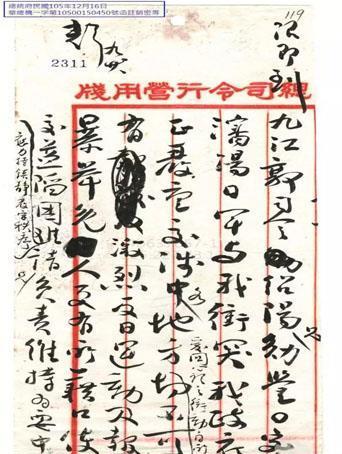After the outbreak of the September 18 Incident, the Kuomintang authorities adopted a policy of "non-resistance", which led to the japanese army easily occupying Shenyang.
Some people say that it was the young marshal Zhang Xueliang who issued the "no resistance" order, which caused the northeast land to be surrendered to people, and some people shouted at Zhang Xueliang, saying that the young marshal was just the executor of the old Chiang Kai-shek's "will." What is the truth?
In recent years, the Kuomintang on the other side of the strait has successively declassified some archives about Lao Chiang, including four telegrams issued by Lao Chiang after 9/18, the contents of which are very worth seeing, and we may be able to see some clues in them.

The first telegram was issued on the third day after the outbreak of the 9/18 incident, and the content of the cable was roughly as follows:
"The Japanese army in Shenyang is in conflict with me, and our government is in serious negotiations... There must be no fierce anti-Japanese movements and retaliatory atrocities, lest there be any excuses..."
The telegram was drafted by Lao Jiang himself, and it was sent to Jinan and several other places, which Lao Jiang believed were most likely to "cause trouble."
The core content of the cable was that "there must be no fierce anti-Japanese movements and retaliatory outbursts", and the old Chiang was afraid that the protests of the people would further "anger" the Japanese, just as Zhang San was slapped by Li Si, and Zhang San, instead of fighting back, worried about whether Li Si's hand would hurt. How could that be!
A few days later, Lao Jiang sent another telegram received by Ye Chuling, who was then the head of the Kuomintang Jiangsu provincial government, and the content of the telegram was roughly as follows:
"The Japanese Navy will come to Zhenjiang again tomorrow... If its sailors go ashore to buy vegetables and other matters, it is best to negotiate with them separately, and the local police station will buy and deliver the ship on their behalf to avoid disputes. ”
A good "caring" telegram, "Chairman Chiang Kai-shek" every day to take care of every opportunity, meticulous, even the Japanese went ashore to buy vegetables such a small thing is also in mind, of course, the core of this telegram is by no means "buying vegetables", but "to avoid disputes", the implication is nothing more than: Don't provoke the Japanese, we can't afford to provoke, hide!
Old Chiang's third telegram was more direct. On June 12, 1935, Lao Jiang called He Yingqin:
"The central troops near Peiping should withdraw on foot, that is, all of them should be evacuated on foot, and they must still prevent pretexts of provocation and try to avoid conflict."
Old Chiang Kai-shek issued a telegram order that the Kuomintang Central Army stationed in Beiping could only be ordered to carry out, and soon withdrew from Beiping, and once it retreated, it was thousands of kilometers. In the final analysis, Lao Chiang was still afraid that the Japanese would "provoke under the pretext" and ask our side to "try to avoid conflict." It seems that the gun barrel of the Kuomintang Central Army did not make Lao Chiang straighten his waist.
Three days later, Old Chiang sent a telegram to He Yingqin, and looking at the contents of his telegram, it should be a supplement to the previous telegram:
“... And for its soldiers, we should try to rotate, and with their dignity, do not make them more annoyed and angry, otherwise the young and strong faction will never give up like this. ”
As it turned out, Old Chiang had already promised to withdraw the Kuomintang troops from Peiping from Peiping, but even so, Old Chiang was not enough, and once again called to ask for "respect for himself" and not to provoke the Japanese to be angry, saying a thousand, saying ten thousand, or a word of "fear."
This is Chiang Kai-shek, the head of the Kuomintang party who was then the head of the "Republic of China,", who was fierce and cruel to his brothers and brothers, and did not blink an eye when he killed people, while he shrank his head and shrank his head and cowered against the Japanese invaders who came to the door, lest he offend the Japanese.
With such a humble knee, where is the dignity of my great power? What old Chiang Kai-shek and the Kuomintang did was truly hateful, infuriating, and lamentable!